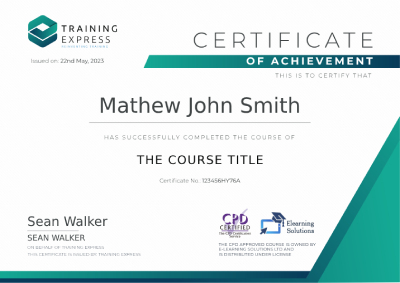GET THIS COURSE AND 1500+ OTHERS FOR ONLY £49 PER YEAR. FIND OUT MORE
16 others bought this course in the last 24 hours!
This Minute Taking Course is ideal for aspiring Minute-Takers, Secretaries and Chairpersons who have a responsibility to manage meeting agendas and improve meeting outcomes. It includes step-by-step training on how to write concise, structured meeting minutes, prepare for a meeting, deal with any challenges during a meeting, and close a meeting successfully.
Effective minute taking is essential to the productivity and success of a business meeting. In this Minute Taking Training Course, you will explore the role and responsibilities of a Minute-Taker and chairperson in detail, including the key skills and qualities needed to oversee and direct business meetings successfully.
You will learn how to write professional minutes that summerise the outcomes of a meeting accurately so that all attendees and those who couldn’t attend, understand what key points to take away. This course is also packed with tips and advice on how to ensure that all matters arising in a meeting are dealt effectively, including strategies for building your professional image and confidence.
- Accredited by CPD
- Instant e-certificate and hard copy dispatch by next working day
- Fully online, interactive course with audio voiceover
- Developed by qualified professionals
- 24/7 Learning Assistance
- Self-paced learning and laptop, tablet, smartphone-friendly
- Discounts on bulk purchases
£24,900 Average Salary, Up to £35,300/yr for this skill according to top UK career sites.
Sneak Peek
Who should take the course
This Minute Taking Masterclass is ideal for anyone who has minute taking or meeting management responsibilities. This includes the following roles:
- Minute Taker
- Chairperson
- Secretary
- Board Director
Certification
Once you’ve successfully completed your course, you will immediately be sent a digital certificate. Also, you can have your printed certificate delivered by post (shipping cost £3.99). All of our courses are fully accredited, providing you with up-to-date skills and knowledge and helping you to become more competent and effective in your chosen field. Our certifications have no expiry dates, although we do recommend that you renew them every 12 months.

Learning Outcomes
By the end of the course, learners will be able to:
- Demonstrate in-depth knowledge of the role of the Minute-Taker
- Understand the key elements that make a meeting successful
- Identify the stages of minute taking and steps to arranging a meeting
- List all the things that should be included in a meeting agenda
- Deal with stressful meetings and conversations that go off-track
- Address all matters arising and close a meeting successfully
- Manage meeting tasks and chase up action items effectively
- Creating a Minutes template and distributing notes to all attendees
Assessment
At the end of the course, there will be an online assessment, which you will need to pass to complete the course. Answers are marked instantly and automatically, allowing you to know straight away whether you have passed. If you haven’t, there’s no limit on the number of times you can take the final exam. All this is included in the one-time fee you paid for the course itself.
Course Curriculum
In module one, we will learn about the key skills required for effective minute taking, as well as the role of the chairperson and Minute-Taker in detail. It also explores the stages of minute taking and steps to arranging a meeting.
In module two, we will learn how to prepare for a meeting, exploring what should be included in the meeting agenda and the rules for seating arrangements. It also includes tips on how to deal with a stressful meeting and what to do when a conversation goes off-track.
In module three, we will explore the structure of a meeting, covering key topics such as meeting introductions, committee business, matters arising, and action items. It also provides step-by-step guidance on how to successfully close a meeting,
In module four, we will be introduced to the Action Triangle, exploring what to do when there is no outcome from a meeting, as well as when there is several actions for one minute.
In module five, we will explore the skills required to be a successful Minute-Taker, taking an in-depth look at best practice procedures for before, during and after a meeting. You will also learn how to structure your notes and make them as clear as possible.
In module six, we will learn a wide range of tips from the experts, from how to sharpen your active listening skills to step-by-step guidance on how to create a Minutes template. It includes what information should be recorded during a meeting and what should be left out.
In module seven, we will explore some technological advancements in minute taking, with information on how to streamline your minute taking, security issues, and software solutions.
In module eight, we will focus on professional development training, with tips and guidance on how to create the right impression, address the attendees of a meeting, deal with challenging situations, and much more.
Course Curriculum
 TAKE THIS COURSE
TAKE THIS COURSE
£125.00£20.00 ex VAT- 1 year
- Course Certificate
- 3 hours, 37 minutes Gift this course
Subscribe to this course and 2,000+ top‑rated Training Express courses for your organization.
Try Training Express Business- For teams of 5 or more users
- 2,000+ fresh & in-demand courses
- Learning Engagement tools
- SSO and LMS Integrations
 Food Hygiene
Food Hygiene Health & Safety
Health & Safety Safeguarding
Safeguarding First Aid
First Aid Business Skills
Business Skills Personal Development
Personal Development









